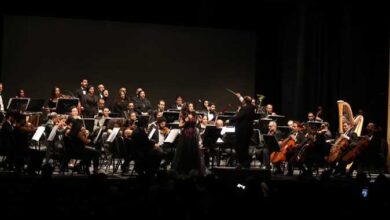Last weekend, from 20 to 22 January, the Cairo Opera House reran its current prize production, Praxa. Promoted as a satirical musical comedy, the show, directed by Nader Salah el-Dein and starring actress/singer Bushra, is a loose adaptation of revered playwright Tawfik el-Hakim’s reworking of Aristophanes’ Lysistrata, modernized and colloquialized to bear little resemblance to its original sources and extist in an alternate reality where ancient Greece and modern day Egypt overlap.
Written in the third century BC, the original Lysistrata tells the story of Athenian women who go on a sex strike to force their militaristic husbands to end the Peloponnesian War with Sparta. Lysistrata — whose name means "releaser of war" — and her cohorts assume the seats of power in the Akropolis, and the play culminates with delegations from the warring parties negotiating peace, represented on stage in the form of a nude female, as they suffer full erections. This is not a scene you’re likely to see rendered on the Egyptian stage, especially in this adaptation,where the storyline deviates from the original plot revolving around gender politics to include broader issues of fair governance in a declining and poverty-stricken civilization.
Audiences will be treated instead to a spectacle, of sorts, immediately recognizable as an imitation of big production Broadway musicals. The sets are gluttonous in scale, the costumes kaleidoscopic and the musical score deliberately grand. The top hats and canes marching down glittering steps are still present in this version of ancient Athens, and over 60 pirouetting dancers populate the stage regularly to execute choreography that may be uninspired but, on the whole, inoffensive. It is a huge collaboration, involving commendable teamwork and more than just a passing whiff of big bucks. Anyone wondering about the funding source of this extravaganza — estimated to hover somewhere in the six figure department — will have their curiosity satisfied on their way out as they’re offered a departing promotional gift pack from EDWY construction, which includes an ugly but extremely practical appointment book-and-pen set.
One distinguishing and surprising feature of this production that sets it apart from its lesser competition is its tight pacing. No one is likely to leave the show fed up as it rarely drops from its thumping third gear that leaves little room for boredom or, for that matter, reflection. Indulgent ad-libbing by the principal actors, sadly an unshakeable tradition in the local theatre scene, is also kept to a bare minimum. Which is not to say that diligent efforts have not been made to infuse the production with a local flavor — we’re supposed to be as much in the dusty streets of Cairo as the decaying courtyards of Athens, remember? The colloquialisms and tireless references to Sharm el-Sheikh and Marina culminate with an impromptu rendition of Ahmed Adawiya’s latest pop tune, intended for a quick cheap laugh, which, thanks to a receptive and generous audience, it gets. It is perhaps this verve, coupled with the impressive production value, that led local media outlets to laud the show enthusiastically in its first run last summer, most of them seemingly unconflicted about performers lip-synching their lyrics, occasionally with painfully bad timing.
Given the show’s promotional tactics, it’s clear that one of the primary reasons for mounting this production was the creation of a vehicle for Bushra, who plays the title role of Praxa. Her recent increasing appearances in films and TV series have been a sticky reminder of how badly she needs a breakthrough role to cement her place among the ranks of her ingénue peers before that ship sails, and great care has been taken to make sure she isn’t upstaged in this show. Though her performance has about as much depth as her speedy costume changes, she does give it 110%. She counters dead beats like a hyperactive gunslinger, terminating the occasional lull by skipping from one part of the stage to another, or parroting a castmate’s lines to elicit a laugh or help explicate the plot, all with admirable zeal.
In 2003, the New-York based "Lysistrata project" was devised in response to the US invasion of Iraq as a worldwide theatrical event for peace. The idea was to stage as many readings of the anti-war play across the globe as possible, then share them via the Internet. Though it lacked the impact many hoped it would have, interesting findings did come out of the experiment, most notably the general diffusion of the gender issue in favor of a clearer anti-war sentiment. This production shares the same progressive spirit with its open and irreverent detachment from its source material, but its politics end up being disappointingly simplistic, if not offensive. The initial surge of feminism that drives the first third of the show gives way to its polar opposite as Praxa tires of the responsibilities of government and looks to occupy her time with an affair. The climax sees Praxa, the philosopher and the general, childishly symbolizing guile, brain and brawn, respectively, facing off against the puppet king they placed in power. The scene devolves into chaos as paranoia takes over the court with each party trying to grab the moral upper hand, and the chorus of citizens are asked to choose their leader. We then immediately break into the song-and-dance finale, an awkward attempt at forcing Aristophanes’ happy ending. But we never get the citizen’s answer or a proper resolution to this version of the story. And as much as the producers may insist on (read: hide behind) their choice to leave things "provocatively" open-ended, no one is left pondering the greater issues at stake. The audience simply takes things at face value, munching away on one last mouthful of cotton candy escapism.
Though this run of the production was short-lived, it will most likely be revived again soon in the absence of any big-budget competition that may emerge this year. Unless you have something else planned, be sure to catch this mostly amusing ride that demonstrates a renewed interest in investing the local scene with bigger shows and the production value to match.




